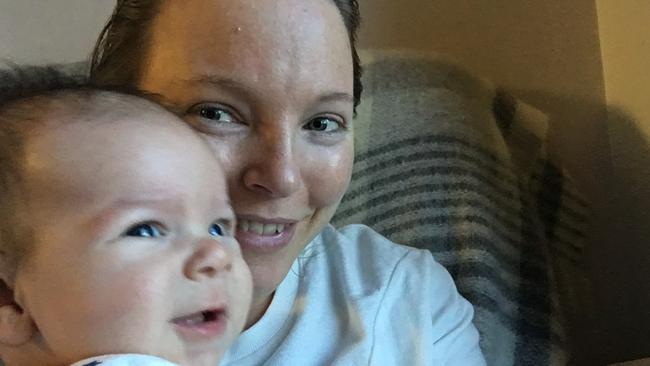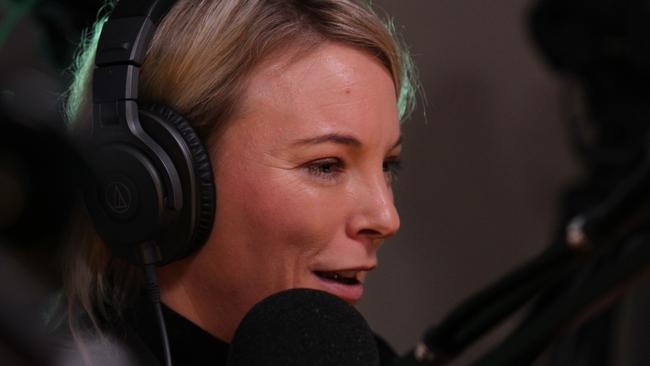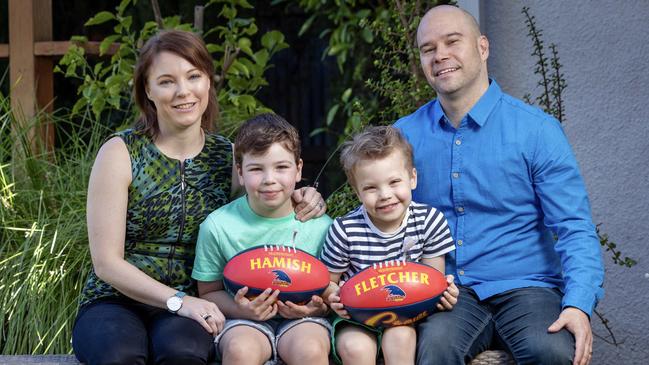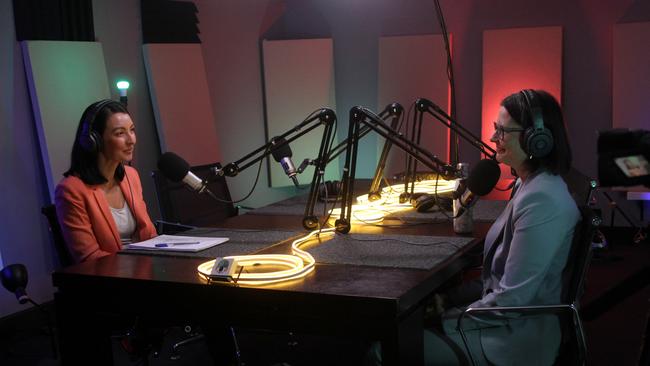Survive and Thrive podcast shares parents’ mental health struggles
Renee Knight says it took more than a week and some precious help after the birth of her son before she could even sleep.
Lifestyle
Don't miss out on the headlines from Lifestyle. Followed categories will be added to My News.
Renee Knight was so anxious after the birth of her first child that she didn’t sleep for 10 days.
Her son Hamish was about five weeks old and “crying all the time”.
One evening husband Sam took him downstairs so Ms Knight could get some sleep but all she could hear was her little boy’s wailing.
“I couldn’t sleep. I had electricity running through my body,” she recalled.
“I got out of bed. I started hyperventilating. I felt like I was really, really high. And I couldn’t get all these thoughts out of my head about what would happen if my baby didn’t sleep.”
Eventually little Hamish nodded off - but Ms Knight would stay awake for the next 10 days.
The now 41-year-old mother of two has shared her story on the Survive and Thrive podcast, produced by Perinatal Anxiety and Depression Australia (PANDA), to help other new and expecting parents.
Launching the second season of the podcast on Tuesday, PANDA chief executive Julie Borninkhof said it aimed to build awareness “by focusing on real stories”.



Today Ms Knight and her husband, 42, live in Adelaide with Hamish, now 7, and his little brother Fletcher, who is 5.
They are close to extended family but when Hamish was born the couple were living in Melbourne.
After she had gone about 48 hours without sleep Ms Knight knew something was wrong and rang her mother in Adelaide, who got on the next flight over.
The following day Ms Knight saw a GP and was prescribed the first of a string of sleeping pills that didn’t work.
“I barely ate, the only thing that kept me going was breastfeeding my son,” she said.
“I just went on in a blur.”
After another two sleepless nights, she returned to the GP and was prescribed an antidepressant and a new sleep medication.
“Every night I would try different ways of getting to sleep,” she said.
“Then it got to the point where I didn’t even lie down. I was not remotely tired.
“I felt like everybody else was living and I was a walking dead person.”
By the sixth evening Mr Knight took his wife to the emergency department where a psychiatrist gave her a stronger medication.
After she was discharged, a home psychiatry team visited their house.
“I honestly thought I was dying. I lay on the floor and just said I wanted to walk in front of a car,” Ms Knight said.
“I begged them to call an ambulance and take me to a mental health hospital.”
But it was not until four days later that she was finally admitted to a specialist mental health unit in Melbourne for mothers and their babies.
Adelaide has a similar facility run by SA Health, known as Helen Mayo House.
Once among experts in a safe place, and with the help of hospital-strength medication, Ms Knight finally slept.
“It had just progressed to the loneliest experience I could possibly think of. I actually thought I would never sleep again,” she said.
Ms Knight stayed with Hamish at the mother-baby unit for six weeks.
When she returned home her family rearranged the furniture in her bedroom and bought fresh sheets, but she again found it difficult to sleep “because of the trauma I’d had during those nights in that house”.
She soon returned to the mother-baby unit for another seven week stay where she focused on meditation and sleep strategies.
She also learned about PANDA’s counselling service.
“I’d never met anyone that had postnatal depression or anxiety. The difference it makes in talking to someone who’s actually gone through what you’re going through is just enormous,” she said.

When the Knights decided to try for a sibling for Hamish, they were prepared.
Ms Knight’s psychiatrist wrote a letter for the team at her birthing hospital asking that she stay an extra day in the maternity ward, not accept visitors and have a dedicated midwife.
She experienced the usual sleep deprivation of life with a newborn after taking baby Fletcher home, but not the same levels of anxiety.
One in five new mothers and one in 10 new fathers experience perinatal mental health issues.
“I try not to scare women by thinking that they need to be really concerned about this but the statistics are quite high,” Ms Knight said.
“Don’t be afraid of what people might think. If something doesn’t feel right go and ask, get some help.”
The first episode of Survive and Thrive Season 2 is available now. New episodes will be released fortnightly on Spotify, YouTube, Apple Podcasts or at panda.org.au





